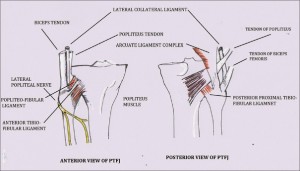 Helping Incorporate Research and Manual Techniques into your Massage Therapy Practice!
Helping Incorporate Research and Manual Techniques into your Massage Therapy Practice!
The proximal tibiofibular joint (PTFJ) is a plane type synovial joint. The primary function of the PTFJ is dissipation of torsional stresses applied at the ankle and the lateral tibial bending moments besides a very significant tensile, rather than compressive weight bearing.
Though rare, early diagnosis and treatment of the PTFJ dislocation are essential to prevent chronic joint instability and extensive surgical intervention to restore normal PTFJ biomechanics, ankle and knee function, especially in athletes prone to such injuries.
PTFJ dislocations often remain undiagnosed in polytrauma scenario with ipsilateral tibial fracture due to the absence of specific signs and symptoms of PTFJ injury. Standard orthopedic textbooks generally describe no specific tests or radiological signs for assessment of the integrity of this joint.
The aim of this paper was to review the relevant clinical anatomy, biomechanics and traumatic pathology of PTFJ with its effect on the knee emphasizing the importance of early diagnosis through a high index of suspicion.
Dislocation of the joint may have serious implications for the knee joint stability since fibular collateral ligament and posterolateral ligament complex is attached to the upper end of the fibula. Any high energy knee injury with peroneal nerve palsy should immediately raise the suspicion of PTFJ dislocation especially if the mechanism of injury involved knee twisting in flexion beyond 80° and in such cases a comparative radiograph of the contralateral side should be performed.
Wider clinical awareness can avoid both embarrassingly extensive surgeries due to diagnostic delays or unnecessary overtreatment due to misinformation on the part of the treating surgeon.
Treatment Technique for the Fibula
Hi Rob…. Fellow RMT here. In an internet filled with poorly made videos, your work stands out. I have been watching online orthopedic videos for years, and I rarely find one that is simple, to the point, and without much ego/showcasing of the practitioner. Thank you for your work!